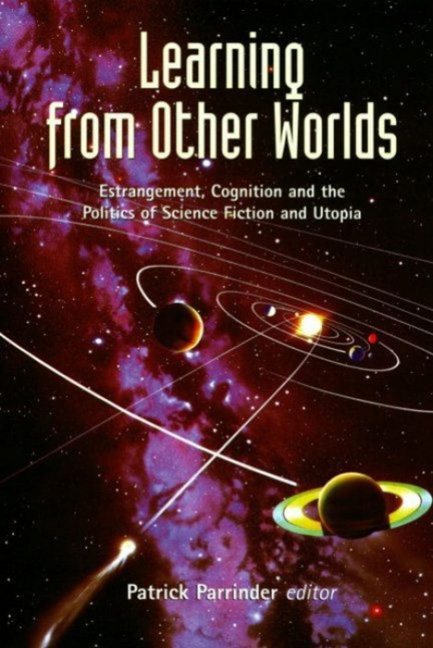Book contents
- Frontmatter
- Contents
- Acknowledgements
- Contributors
- Introduction: Learning from Other Worlds
- Part I Science Fiction and Utopia: Theory and Politics
- Part II Science Fiction in its Social, Cultural and Philosophical Contexts
- From the Images of Science to Science Fiction
- Estranged Invaders: The War of the Worlds
- ‘A part of the … family [?]’: John Wyndham's The Midwich Cuckoos as Estranged Autobiography
- Labyrinth, Double and Mask in the Science Fiction of Stanislaw Lem
- ‘We're at the start of a new ball game and that's why we're all real nervous’: Or, Cloning—Technological Cognition Reflects Estrangement from Women
- ‘If I find one good city I will spare the man’: Realism and Utopia in Kim Stanley Robinson's Mars Trilogy
- Afterword: With Sober, Estranged Eyes
- Darko Suvin: Checklist of Printed Items that Concern Science Fiction (with Utopian Fiction or Utopianism, and a Few Bordering Items)
- Bibliography
- Index
‘A part of the … family [?]’: John Wyndham's The Midwich Cuckoos as Estranged Autobiography
from Part II - Science Fiction in its Social, Cultural and Philosophical Contexts
- Frontmatter
- Contents
- Acknowledgements
- Contributors
- Introduction: Learning from Other Worlds
- Part I Science Fiction and Utopia: Theory and Politics
- Part II Science Fiction in its Social, Cultural and Philosophical Contexts
- From the Images of Science to Science Fiction
- Estranged Invaders: The War of the Worlds
- ‘A part of the … family [?]’: John Wyndham's The Midwich Cuckoos as Estranged Autobiography
- Labyrinth, Double and Mask in the Science Fiction of Stanislaw Lem
- ‘We're at the start of a new ball game and that's why we're all real nervous’: Or, Cloning—Technological Cognition Reflects Estrangement from Women
- ‘If I find one good city I will spare the man’: Realism and Utopia in Kim Stanley Robinson's Mars Trilogy
- Afterword: With Sober, Estranged Eyes
- Darko Suvin: Checklist of Printed Items that Concern Science Fiction (with Utopian Fiction or Utopianism, and a Few Bordering Items)
- Bibliography
- Index
Summary
‘We ordered some asparagus and got triffids.’ This joke complaint from a 1997 British cinema and television ad (for—it turns out—telephone banking services) alludes to the novel The Day of the Triffids originally published in 1951 by John Wyndham, who died in 1969. There are not many science fiction writers who have imprinted any of their works on the consciousness of a nation to the extent that the recognition of an allusion could be so readily assumed. This has something to do with the fact that Wyndham's paperback publishers, Penguin Books, have kept his best works continuously in print. Other SF titles come and go but that rectangle of orange, made up of those Penguin spines, remains a sober, respectable fixture of the SF shelves of English-language bookstores worldwide. (Outside the English-speaking world, too, Wyndham has been widely read in translations, the translators of The Day of the Triffids into Serbo-Croat being none other than Darko Suvin and his late mother.) And yet the amount of critical and biographical attention that Wyndham, or John Wyndham Parkes Lucas Beynon Harris (as he was amply named in full), and his works have received is negligible. In what follows I shall refer to the authorial persona as ‘Wyndham’ (often within quotation marks) and, more frequently, to the man himself as Harris. While ‘Wyndham's’ books are well known (if little studied), Harris is the invisible man of British SF.
When, in the 1980s, Tom and Alice Clareson embarked on what was to be the first book-length study (a project aborted by Tom Clareson's death), they quickly came up against a major stumbling block—the unavailability of Harris's papers. At that time they were in the possession of Harris's brother Vivian at Vivian's home in Hythe, Kent. After Vivian's death on 12 June 1987 and that of Harris's widow on 2 June 1991, they were apparently sold to a private collector who, in 1992, engaged the London antiquarian bookseller, Bertram Rota Ltd, together with Harris's (and Vivian's) solicitor, Brian Bowcock, to sort them into the John Wyndham Archive. In 1997 Bertram Rota Ltd resold the Archive (now augmented by five hundred letters that, during the Second World War, Harris wrote to the schoolteacher Grace Wilson—his eventual wife) to the University of Liverpool's Sydney Jones Library, where the Wyndham Archive may now be consulted by interested researchers.
- Type
- Chapter
- Information
- Learning from Other WorldsEstrangement, Cognition, and the Politics of Science Fiction and Utopia, pp. 146 - 177Publisher: Liverpool University PressPrint publication year: 2000



